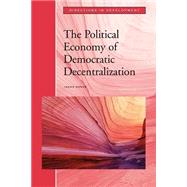
Note: Supplemental materials are not guaranteed with Rental or Used book purchases.
Purchase Benefits
Looking to rent a book? Rent The Political Economy of Democratic Decentralization [ISBN: 9780821344705] for the semester, quarter, and short term or search our site for other textbooks by Manor, James. Renting a textbook can save you up to 90% from the cost of buying.
| Abstract | vii | ||||
| Foreword | ix | ||||
| Acknowledgements | xi | ||||
| Introduction | 1 | (3) | |||
| PART I Defining Terms | 4 | (9) | |||
|
4 | (4) | |||
|
8 | (2) | |||
|
10 | (3) | |||
| PART II The Problem of Hubris: Regimes' Centralizing Tendencies and Earlier Experiments with Decentralization | 13 | (13) | |||
|
13 | (10) | |||
|
23 | (3) | |||
| PART III Explaining the Latest Wave of Decentralizations | 26 | (27) | |||
|
27 | (9) | |||
|
36 | (4) | |||
|
40 | (13) | |||
| PART IV Politics, State-Society Relations, and Decentralization | 53 | (28) | |||
|
55 | (2) | |||
|
57 | (1) | |||
|
58 | (1) | |||
|
59 | (1) | |||
|
60 | (1) | |||
|
61 | (1) | |||
|
62 | (1) | |||
|
63 | (2) | |||
|
65 | (1) | |||
|
65 | (1) | |||
|
66 | (1) | |||
|
67 | (1) | |||
|
67 | (1) | |||
|
68 | (1) | |||
|
69 | (1) | |||
|
70 | (1) | |||
|
71 | (1) | |||
|
71 | (1) | |||
|
72 | (1) | |||
|
72 | (1) | |||
|
73 | (1) | |||
|
73 | (1) | |||
|
74 | (1) | |||
|
75 | (1) | |||
|
76 | (1) | |||
|
77 | (1) | |||
|
78 | (3) | |||
| PART V Assessing Decentralization to the Regional as well as the Local Level | 81 | (7) | |||
|
81 | (1) | |||
|
81 | (1) | |||
|
82 | (1) | |||
|
82 | (1) | |||
|
83 | (1) | |||
|
83 | (1) | |||
|
83 | (1) | |||
|
83 | (1) | |||
|
84 | (1) | |||
|
84 | (1) | |||
|
84 | (1) | |||
|
84 | (1) | |||
|
84 | (1) | |||
|
85 | (1) | |||
|
85 | (1) | |||
|
85 | (1) | |||
|
85 | (1) | |||
|
85 | (1) | |||
|
86 | (1) | |||
|
86 | (1) | |||
|
86 | (1) | |||
|
86 | (2) | |||
| PART VI How Promising is Decentralization for Rural Development | 88 | (30) | |||
|
88 | (6) | |||
|
94 | (13) | |||
|
107 | (11) | |||
| Summary | 118 | (3) | |||
| References | 121 | (9) | |||
| Index | 130 |
The New copy of this book will include any supplemental materials advertised. Please check the title of the book to determine if it should include any access cards, study guides, lab manuals, CDs, etc.
The Used, Rental and eBook copies of this book are not guaranteed to include any supplemental materials. Typically, only the book itself is included. This is true even if the title states it includes any access cards, study guides, lab manuals, CDs, etc.